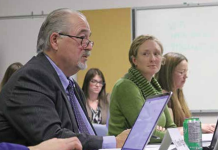After being unveiled as the new face of the Haliburton Kawartha Northumberland Peterborough health unit (HKNP) last week, Dr. Thomas Piggott said his main priorities are improving program capacity and ensuring the organization can effectively respond to any future health emergency.
The new acting medical officer of health for the region addressed media Feb. 10, reiterating the merger between Peterborough Public Health, which he oversaw, and the Haliburton, Kawartha, Pine Ridge district health unit was brought on due to the impacts of the COVID-19 pandemic.
“I’m really hoping, through this merger, we can address the shortfalls and have better readiness and capacity to respond to future threats,” Piggott said. “We know a larger organization, with more back-up, crosscoverage and depth of staff and experience is going to strengthen our ability to serve our communities.”
He said through the first few weeks of the merger, which became official Jan. 1, the unit has found “several hundreds of thousands of dollars” in efficiencies, allowing for that money to be allocated elsewhere.
Piggott identified things like student vaccinations and restaurant inspections as two areas where public health has “struggled to catch up” after programs were paused during the pandemic.
While general costs for office space, utilities, equipment and materials have spiked due to inflation in recent years, and staff salaries also increasing, Piggott said the money received from the Ministry of Health has rarely kept up.
“Public health has been getting sub-inflationary increases for the past two decades… that ultimately means we’re forced into providing less services year in, year out,” he said. “This merger is an opportunity to reset that, put us back on track, and find even more efficiencies so we can continue to maintain, grow and build service delivery.”
He expects that process to happen gradually over several years – noting the only changes people may see in the short-term are on the health unit’s new branding. He said an official name will be unveiled in the spring.
While Piggott has gained his experience all over the world – working with Doctors Without Borders in the Democratic Republic of Congo, serving as medical officer of health and VP lead for rural and remote health in northern Labrador, and serving as a physician in cities like Hamilton, he is familiar with the Highlands region.
His wife grew up in Oakwood, with the family having a cottage outside Minden where his family spend their weekends over the summer. He said Haliburton County is one of his favourite places. “We deeply appreciate this geography, just spending time in nature – biking, hiking, canoeing, camping, skiing, just taking advantage of what we have in this beautiful region… the trails in Haliburton [for] hiking. The whole area is really wonderful,” he said.
Unit hopes to retain Dr. Bocking
Ron Black, HKNP board chair, said the unit is preparing an application to secure a second public health physician position – which he hopes will be enough to retain Dr. Natalie Bocking, formerly medical officer of health (MOH) with HKPR. She was named deputy MOH with HKNP. SOLD! “Typically, health units above 250,000 people have a second physician – our population is somewhere over 300,000 so we certainly recognize having another person with that expertise within the organization would be very, very important to us,” Black said.
Piggott said he and Bocking have a good working relationship and that collaborating through the transition would be important. “That legacy knowledge and understanding of the [HKPR communities] is critical,” Piggott said.
Highlands East deputy mayor Cec Ryall, who serves as HKNP vice chair, said one of the early focuses of the merger has been ensuring smaller populated communities, like Haliburton County, are properly serviced. He said the unit’s satellite offices in Lindsay, Port Hope and Haliburton will remain open for the foreseeable future.
Six weeks into the merger, Ryall is convinced it will be a benefit to all residents of the region. He noted public health is responsible for things like tracking disease outbreaks, immunizations, assisting with mental and sexual health, and more.
“We’re learning already that PPH has been able to successfully handle things in a better way than HKPR, and vice versa… as we continue to move forward, things will evolve.




